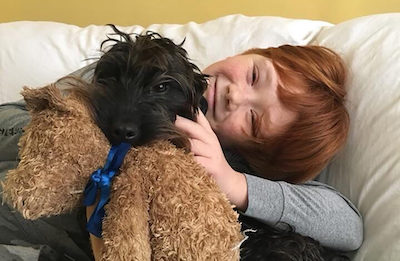Charlotte’s Story: Patient- and Family-Centered Care

“The afternoon knows what the morning never suspected”—Robert Frost.
Lincoln was born healthy on Valentine’s Day 2007. He was born via caesarean section, and we spent the next four days in the hospital, uneventfully recovering and learning about one another.
On Linc’s fifth day of life, after returning home we had a morning filled with snoozing and nursing and diaper changing and more nursing, my husband announced he was going to the grocery story. Linc and I were blissfully snuggled into bed: me, recovering from the caesarean surgery and reading a cooking magazine, Linc with a full belly and cozy onesie and spiky red hair, asleep on his back, just as the American Academy of Pediatrics recommends.
Five Minutes Later, Our Lives Changed Forever.
As I casually closed the magazine I had been reading I glanced over at my sleeping infant, his mounds of spiky red hair almost glittering in the winter window light. I mention this because it was one of the first things my terrified mind noticed: how his flaming hair was so totally vibrant against his ever-darkening bluish-purple skin.
Call 911.
I figured out how to put the phone on speaker so that I could attempt to give life-saving breaths to Linc: chest compression, air, I love you; chest compression, air, I love you; chest compression, air, I love you.
By the time the ambulance arrived, Linc had not been breathing for almost four minutes.
Lincoln was hospitalized at the University of Vermont Children’s Hospital for three weeks. More tubes of blood were taken from him and tested than I could have ever imagined. He was seen, it seemed at the time, by 10,385 different pediatric specialists.
I Felt Alone
Linc was discharged from the hospital with a nebulous diagnosis and daunting plan of care: I needed to wake Linc every 1.5 hours and test his blood sugar before and after each feeding. I needed to chart each feeding, each blood sugar test. I needed to give Lincoln an intense anti-seizure medication daily and ensure that he did not throw it up, or else he could have a seizure and cease breathing again. I attempted to do this while simultaneously parenting my two year old. I felt alone.
When Lincoln was two years old, he wasn’t walking independently and had developed a motoric tic: he would shake his head back and forth, back and forth, sometimes ceaselessly. His neurologist suspected the part of his brain in charge of motor development had been damaged from the seizures he had as an infant. Linc then began physical and occupational therapy.
When Lincoln was four years old, he was diagnosed with a heart condition called mitral valve stenosis and aortic coarctation. He easily tires. He gets out of breath. Lincoln will likely need to have heart surgery in the future. When Lincoln was nine years old, he was diagnosed with a growth hormone deficiency. He began getting a shot of genotropin every single night.
Making Connections to Care and Community
Around this same time, I was connected with Amy Cohen, and learned of an opportunity at the UVM Children’s Hospital for me to blend my educational background and professional passion for supporting family systems with my personal experience navigating the health care system with Linc. Through a grant from the Children’s Miracle Network, I was hired here at UVM Children’s Hospital to coordinate the patient- and family-centered care program.
One of the most profound aspects of my role is connecting with families who have experienced the unthinkable: families whose children were born weighing two pounds; families whose children have a rare genetic condition; families whose children were diagnosed with cancer; families who have had children pass away. Through my work I am able to show them that their perspective, their experience, their story, matters. I help create mechanisms for families to communicate and collaborate with health care professionals in meaningful ways. In doing so, each families’ strength in surmounting the unthinkable is validated; their resilience is reinforced.
For an organization to actively invite patient and family feedback, perspective and wisdom is an act of humility. It is this sustained commitment to partnering with families in ways that are useful and affirming that allow all of us to be participants in creating resilient children, resilient families and resilient communities. I am so proud to be on this journey with you all, and am so thankful to my now 12 year old red-headed Lincoln for being my inspiration.
Charlotte Safran is a patient-and family-centered care coordinator at University of Vermont Children’s Hospital.
Patients and families have valuable wisdom, advice and experiences to share. We invite families to join our Patient/Family Advisory Council. Interested? Join us by visiting: https://www.uvmhealth.org/medcenter/Pages/Patients-and-Visitors/Patients/Patient-and-Family-Advisors.aspx







